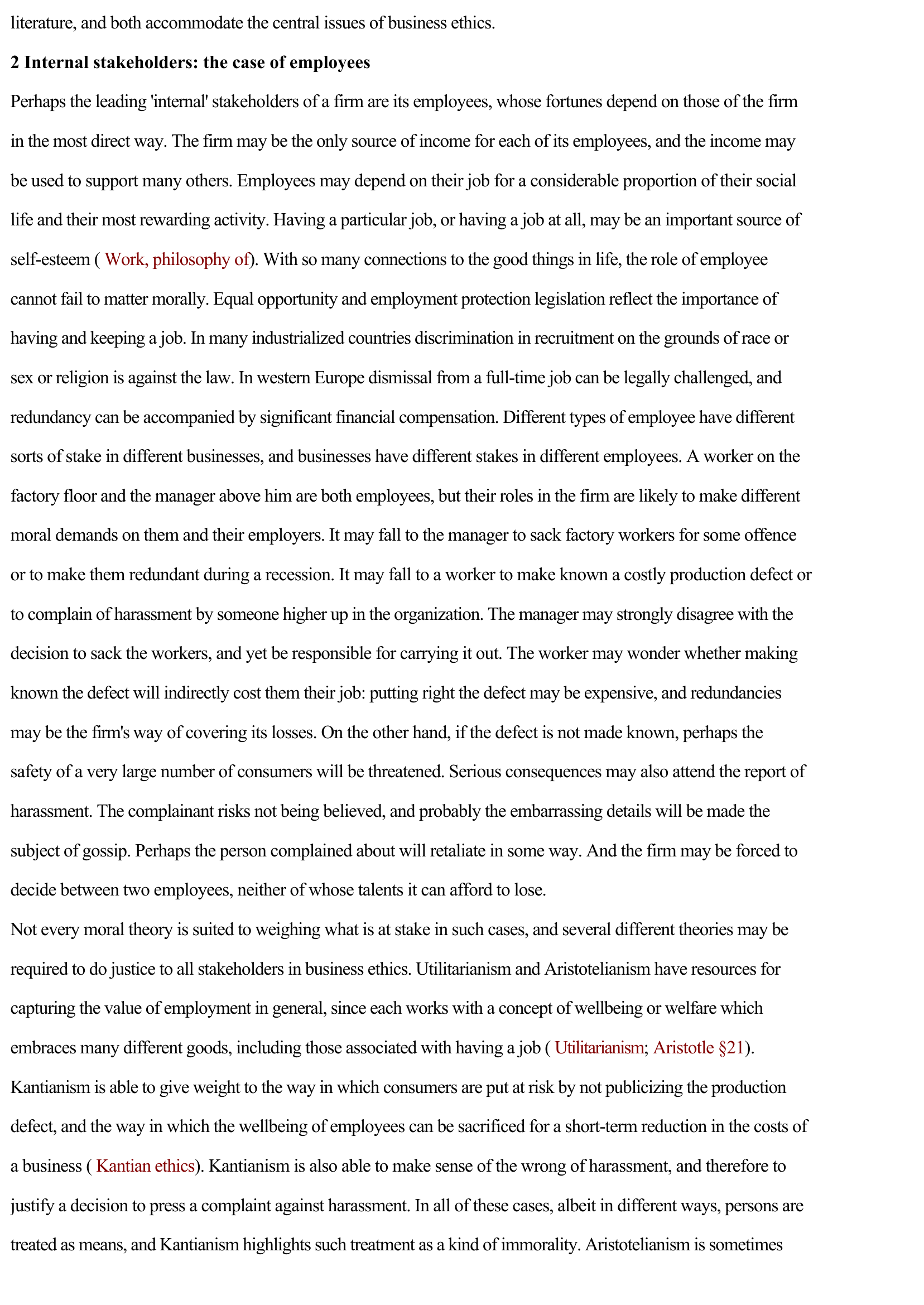Business ethics
Publié le 22/02/2012
Extrait du document
«
literature, and both accommodate the central issues of business ethics.
2 Internal stakeholders: the case of employees
Perhaps the leading 'internal' stakeholders of a firm are its employees, whose fortunes depend on those of the firm
in the most direct way.
The firm may be the only source of income for each of its employees, and the income may
be used to support many others.
Employees may depend on their job for a considerable proportion of their social
life and their most rewarding activity.
Having a particular job, or having a job at all, may be an important source of
self-esteem ( Work, philosophy of ).
With so many connections to the good things in life, the role of employee
cannot fail to matter morally.
Equal opportunity and employment protection legislation reflect the importance of
having and keeping a job.
In many industrialized countries discrimination in recruitment on the grounds of race or
sex or religion is against the law.
In western Europe dismissal from a full-time job can be legally challenged, and
redundancy can be accompanied by significant financial compensation.
Different types of employee have different
sorts of stake in different businesses, and businesses have different stakes in different employees.
A worker on the
factory floor and the manager above him are both employees, but their roles in the firm are likely to make different
moral demands on them and their employers.
It may fall to the manager to sack factory workers for some offence
or to make them redundant during a recession.
It may fall to a worker to make known a costly production defect or
to complain of harassment by someone higher up in the organization.
The manager may strongly disagree with the
decision to sack the workers, and yet be responsible for carrying it out.
The worker may wonder whether making
known the defect will indirectly cost them their job: putting right the defect may be expensive, and redundancies
may be the firm's way of covering its losses.
On the other hand, if the defect is not made known, perhaps the
safety of a very large number of consumers will be threatened.
Serious consequences may also attend the report of
harassment.
The complainant risks not being believed, and probably the embarrassing details will be made the
subject of gossip.
Perhaps the person complained about will retaliate in some way.
And the firm may be forced to
decide between two employees, neither of whose talents it can afford to lose.
Not every moral theory is suited to weighing what is at stake in such cases, and several different theories may be
required to do justice to all stakeholders in business ethics.
Utilitarianism and Aristotelianism have resources for
capturing the value of employment in general, since each works with a concept of wellbeing or welfare which
embraces many different goods, including those associated with having a job ( Utilitarianism ; Aristotle §21 ).
Kantianism is able to give weight to the way in which consumers are put at risk by not publicizing the production
defect, and the way in which the wellbeing of employees can be sacrificed for a short-term reduction in the costs of
a business ( Kantian ethics ).
Kantianism is also able to make sense of the wrong of harassment, and therefore to
justify a decision to press a complaint against harassment.
In all of these cases, albeit in different ways, persons are
treated as means, and Kantianism highlights such treatment as a kind of immorality.
Aristotelianism is sometimes.
»
↓↓↓ APERÇU DU DOCUMENT ↓↓↓
Liens utiles
- Business ethics project
- Does the "access" or "service" model that has replaced the "ownership" model in the business practice of companies such as Kindle/Amazon take fairly into account the interests and/or rights of the consumers?
- Business plan: Warm and cozy
- DARON ACEMOGLU AND JAMES A. ROBINSON, WHY NATIONS FAIL, CROWN BUSINESS, 2012, 529P.
- What are reasons and why do they matter in ethics?

































